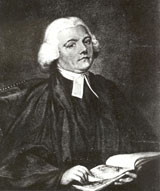
The Orange River Colony was the British colony created after Britain first occupied (1900) and then annexed (1902) the independent Orange Free State in the Second Boer War. The colony ceased to exist in 1910, when it was absorbed into the Union of South Africa as the Orange Free State Province.

Gilbert White was a "parson-naturalist", a pioneering English naturalist, ecologist, and ornithologist. He is best known for his Natural History and Antiquities of Selborne.

William Waldegrave Palmer, 2nd Earl of Selborne, styled Viscount Wolmer between 1882 and 1895, was a British politician and colonial administrator, who served as High Commissioner for Southern Africa.

Roundell Palmer, 1st Earl of Selborne, was an English lawyer and politician. He served twice as Lord High Chancellor of Great Britain.

Earl of Selborne, in the County of Southampton, is a title in the Peerage of the United Kingdom. It was created in 1882 for the lawyer and Liberal politician Roundell Palmer, 1st Baron Selborne, along with the subsidiary title of Viscount Wolmer, of Blackmoor in the County of Southampton. He had already been made Baron Selborne, of Selborne in the County of Southampton, in 1872, also in the Peerage of the United Kingdom. Both his son, the second Earl, and grandson, the third Earl, were prominent Liberal Unionist politicians. The latter was in 1941 called to the House of Lords through a writ of acceleration in his father's barony of Selborne. The third Earl's grandson, the fourth Earl, served as one of the ninety elected hereditary peers that remain in the House of Lords after the passing of the House of Lords Act 1999, and sat as a Conservative. As of 2021, the titles are held by the latter's son, the fifth earl, who succeeded his father in that year.

Selborne is a village in Hampshire, England, 3.9 miles (6.3 km) south of Alton, and just within the northern boundary of the South Downs National Park. The village receives visitors because of its links with the naturalist Revd. Gilbert White, a pioneer of birdwatching.

Thomas Hornsey Bell FRS FLS was an English zoologist, dental surgeon and writer, born in Poole, Dorset, England.
Sidney Faithorn Green (1841–1916) was an English clergyman who, during the Ritualist controversies in the Church of England, was imprisoned for 20 months for liturgical practice contrary to the Public Worship Regulation Act 1874.

George Ridding was an English headmaster and bishop.

Selborne Common is a 99.6-hectare (246-acre) biological Site of Special Scientific Interest west of Selborne in Hampshire. It is a Nature Conservation Review site, Grade I, and is part of the East Hampshire Hangers Special Area of Conservation. It is managed by the National Trust.
Greatham is a village and civil parish in the East Hampshire district of Hampshire, England. It is 1.9 miles (3.1 km) north of Liss, just off the A3 road.

Nature writing is nonfiction or fiction prose about the natural environment. It often draws heavily from scientific information and facts while also incorporating philosophical reflection upon various aspects of nature. Works are frequently written in the first person and include personal observations.

Roundell Cecil Palmer, 3rd Earl of Selborne, CH, PC, known as "Top Wolmer" and styled Viscount Wolmer from 1895 to 1941, was a British administrator, intelligence officer and Conservative politician.
Verlyn Klinkenborg is an American non-fiction author, academic, and former newspaper editor, known for his writings on rural America.

John Roundell Palmer, 4th Earl of Selborne,, was a British peer, ecological expert, and businessman. He was one of the hereditary peers elected to remain in the House of Lords after the enactment of the House of Lords Act 1999, sitting as a Conservative. He re-designated as non-affiliated in September 2019 and retired from the House on 26 March 2020.

The Natural History and Antiquities of Selborne, or just The Natural History of Selborne is a book by English parson-naturalist Gilbert White (1720–1793). It was first published in 1789 by his brother Benjamin. It has been continuously in print since then, with nearly 300 editions up to 2007.
Benjamin White or Ben White was a successful Fleet Street publisher. He was the first publisher to specialise in books on Natural History including The Natural History of Selborne which was written by his brother, Gilbert White.
David George Boyce (1942–2020), also known as George Boyce, was a Northern Irish historian who specialised in Irish history.

Beatrix Maud Palmer, Countess of Selborne was a British political and women's rights activist.

The Honourable Robert Stafford Arthur Palmer was a British Army officer, barrister and poet. Palmer was born into an aristocratic family. He was the son of William Palmer, 2nd Earl of Selborne, grandson of Robert Gascoyne-Cecil, 3rd Marquess of Salisbury, and cousin to Sir Edward Grey. Palmer was educated at Colet Court and Winchester College and developed an interest in the Church of England and law at an early age. He won a scholarship to University College, Oxford, where he studied classical moderations and literae humaniores (classics). At university he was president of the Oxford University Church Union and the Oxford Union debating society. In between studies he volunteered at the Oxford House Church of England settlement and campaigned in support of the Liberal Unionist Party.














